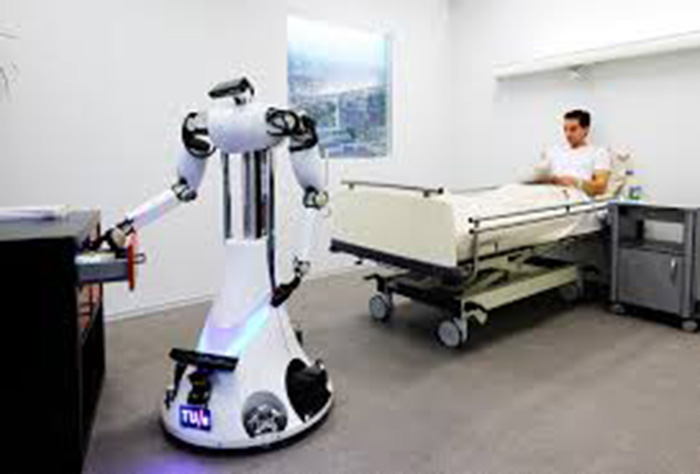Robot helps hospital-bound kids go on

Because these patients can’t physically visit the museum, Keith Miller, a local computer science professor, concocted a plan to take them there virtually. Miller collaborated with hospital teachers and child life specialists to allow a VGo robot nicknamed Celia to help hospital-bound children break free and virtually leave their hospital rooms to visit the science center.
“It’s something that they can do that any other kid would be doing right now— especially because every school takes a field trip to the science center if you’re in the St. Louis area,” Linda Casper, an on-site school teacher at Children’s, told FoxNews.com. “So this was one step closer to normalcy for our kids, and it beats doing worksheets any day.”
Using a laptop that is remotely connected to the telepresence robot through Wi-Fi, children can look through Celia`s eye and learn all about the exhibits at the science center.
Ten-year old Amira Evans, who is battling a rare blood and bone marrow cancer, has spent the last three months at Children`s and has a long and aggressive treatment plan ahead of her. She is one of the pediatric cancer patients who has been able to escape her hospital room thanks to Celia.
“She hasn’t been out since the first day we checked in,” Theresa Evans, Amira’s mother, told FoxNews.com. “We’ve been hoping that she could come home before her second treatment of chemo, but her [blood cell] counts weren’t high enough, so now we have to wait and see if her counts go up to be able to go home before her transplant.”
Because Amira is a high-risk patient— with acute myelogenous leukemia (AML)— she will receive two to three cycles of chemotherapy then a bone marrow transplant.
“High-risk AML requires several courses of very intense chemotherapy that are targeted to completely get rid of all the leukemia, but, as a side effect, it also completely suppresses her entire bone marrow and her immune system,” Dr. Jeffrey Bednarski, Amira’s pediatric oncologist at the St. Louis Children`s hospital, told FoxNews.com.
Without a healthy immune system to fight off infection, Amira has to stay in a safe and controlled environment— a place where she won’t be around a lot of people who could potentially pass on a life-threatening infection to her.
On Amira’s big day out with Celia, her face is projected on the front screen on the robot while she drives and navigates the museum’s attractions. She made stops at exhibits like the DB Fossil Prep Lab, where she got to look at real dinosaur fossils. Next, she was off to The Pacific Coral Reef aquarium, where she saw exotic fishes and learned about reefs and ocean ecology.
"I’ve never seen a fish like that before,” Amira exclaimed to her mother.
Educational benefits are only one benefit pediatric cancer patients can gain with Celia’s virtual tour.
“I knew the biggest thing was going to be being able to see and talk to other kids— being the interesting thing that kids want to talk to because you’re a robot, not because all of your hair is falling out,” Casper said. “They’re not curious about their illness; they’re curious about this cool robot— and that just frees the kids in a whole new way.”
Celia costs about $7,000 off the shelf, but prof. Miller donated it to Children’s.
Casper is optimistic that in time they can get Celia to travel with kids to other places like the local zoo and the art museum.
Amira’s first virtual field trip was a success, and she remains positive about her treatment. She has one more cycle of chemotherapy to go before she undergoes a bone marrow transplant.















































